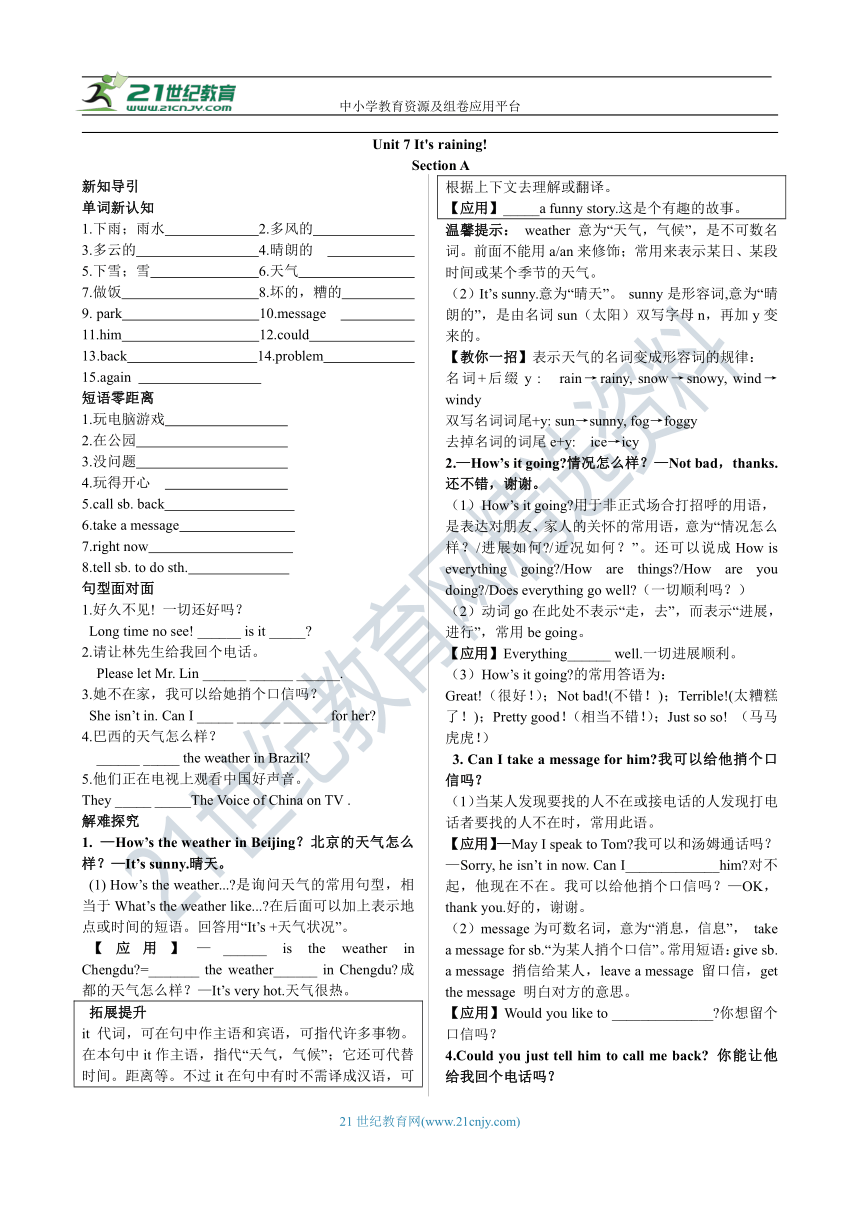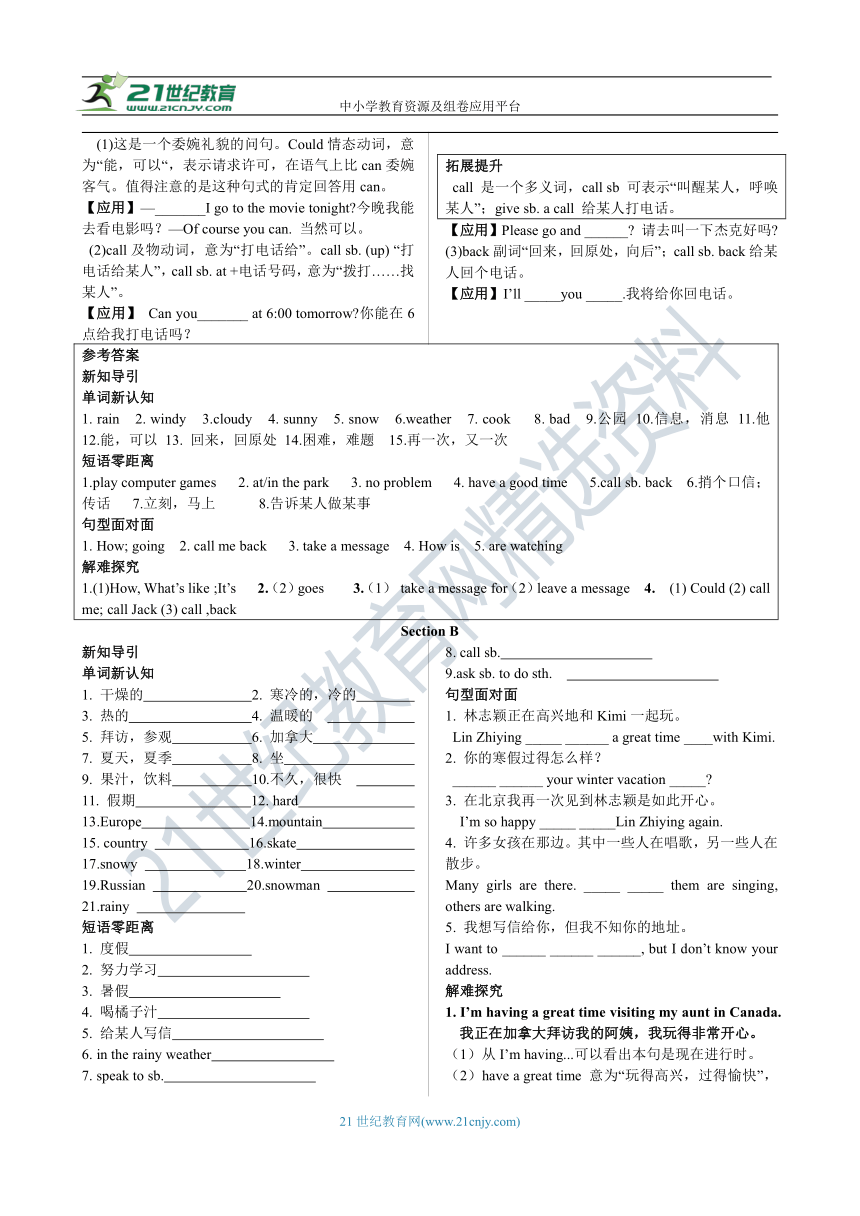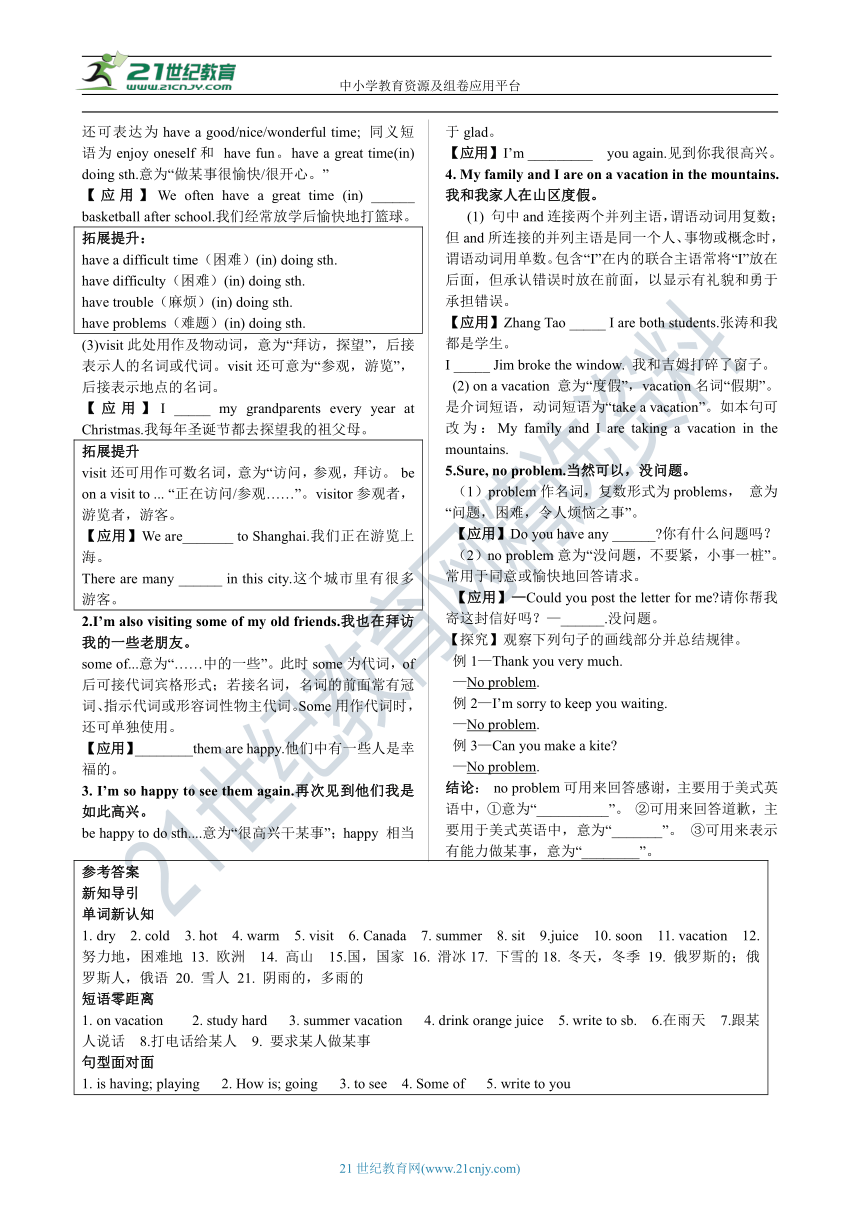Unit 7 It’s raining!全单元同步学案(含答案)
文档属性
| 名称 | Unit 7 It’s raining!全单元同步学案(含答案) |  | |
| 格式 | zip | ||
| 文件大小 | 1.2MB | ||
| 资源类型 | 试卷 | ||
| 版本资源 | 人教新目标(Go for it)版 | ||
| 科目 | 英语 | ||
| 更新时间 | 2019-05-14 07:26:18 | ||
图片预览



文档简介
中小学教育资源及组卷应用平台
Unit 7 It's raining!
Section A
新知导引
单词新认知
1.下雨;雨水 2.多风的
3.多云的 4.晴朗的
5.下雪;雪 6.天气
7.做饭 8.坏的,糟的
9. park 10.message
11.him 12.could
13.back 14.problem
15.again
短语零距离
1.玩电脑游戏
2.在公园
3.没问题
4.玩得开心
5.call sb. back
6.take a message
7.right now
8.tell sb. to do sth.
句型面对面
1.好久不见! 一切还好吗?
Long time no see! ______ is it _____?
2.请让林先生给我回个电话。
Please let Mr. Lin ______ ______ ______.
3.她不在家,我可以给她捎个口信吗?
She isn’t in. Can I _____ ______ ______ for her?
4.巴西的天气怎么样?
______ _____ the weather in Brazil?
5.他们正在电视上观看中国好声音。
They _____ _____The Voice of China on TV .
解难探究
1. —How’s the weather in Beijing?北京的天气怎么样?—It’s sunny.晴天。
(1) How’s the weather...?是询问天气的常用句型,相当于What’s the weather like...?在后面可以加上表示地点或时间的短语。回答用“It’s +天气状况”。
【应用】—______ is the weather in Chengdu?=_______ the weather______ in Chengdu?成都的天气怎么样?—It’s very hot.天气很热。
拓展提升it 代词,可在句中作主语和宾语,可指代许多事物。在本句中it作主语,指代“天气,气候”;它还可代替时间。距离等。不过it在句中有时不需译成汉语,可根据上下文去理解或翻译。【应用】_____a funny story.这是个有趣的故事。
温馨提示: weather 意为“天气,气候”,是不可数名词。前面不能用a/an来修饰;常用来表示某日、某段时间或某个季节的天气。
(2)It’s sunny.意为“晴天”。 sunny是形容词,意为“晴朗的”,是由名词sun(太阳)双写字母n,再加y变来的。
【教你一招】表示天气的名词变成形容词的规律:
名词+后缀y : rain→rainy, snow→snowy, wind→windy
双写名词词尾+y: sun→sunny, fog→foggy
去掉名词的词尾e+y: ice→icy
2.—How’s it going?情况怎么样?—Not bad,thanks.还不错,谢谢。
(1)How’s it going?用于非正式场合打招呼的用语,
是表达对朋友、家人的关怀的常用语,意为“情况怎么样?/进展如何?/近况如何?”。还可以说成How is everything going?/How are things?/How are you doing?/Does everything go well?(一切顺利吗?)
(2)动词go在此处不表示“走,去”,而表示“进展,进行”,常用be going。
【应用】Everything______ well.一切进展顺利。
(3)How’s it going?的常用答语为:
Great!(很好!);Not bad!(不错!);Terrible!(太糟糕了!);Pretty good!(相当不错!);Just so so! (马马虎虎!)
3. Can I take a message for him?我可以给他捎个口信吗?
(1)当某人发现要找的人不在或接电话的人发现打电话者要找的人不在时,常用此语。
【应用】—May I speak to Tom?我可以和汤姆通话吗?
—Sorry, he isn’t in now. Can I?????????_____________him?对不起,他现在不在。我可以给他捎个口信吗?—OK, thank you.好的,谢谢。
(2)message为可数名词,意为“消息,信息”, take a message for sb.“为某人捎个口信”。常用短语:give sb. a message 捎信给某人,leave a message 留口信,get the message 明白对方的意思。
【应用】Would you like to ???????______________?你想留个口信吗?
4.Could you just tell him to call me back? 你能让他给我回个电话吗?
(1)这是一个委婉礼貌的问句。Could情态动词,意为“能,可以“,表示请求许可,在语气上比can委婉客气。值得注意的是这种句式的肯定回答用can。
【应用】—_______I go to the movie tonight?今晚我能去看电影吗?—Of course you can. 当然可以。
(2)call及物动词,意为“打电话给”。call sb. (up) “打电话给某人”,call sb. at +电话号码,意为“拨打……找某人”。
【应用】 Can you_______ at 6:00 tomorrow?你能在6点给我打电话吗?
拓展提升 call 是一个多义词,call sb 可表示“叫醒某人,呼唤某人”;give sb. a call 给某人打电话。
【应用】Please go and ______? 请去叫一下杰克好吗?
(3)back副词“回来,回原处,向后”;call sb. back给某人回个电话。
【应用】I’ll _____you _____.我将给你回电话。
参考答案新知导引单词新认知1. rain 2. windy 3.cloudy 4. sunny 5. snow 6.weather 7. cook 8. bad 9.公园 10.信息,消息 11.他 12.能,可以 13. 回来,回原处 14.困难,难题 15.再一次,又一次短语零距离1.play computer games 2. at/in the park 3. no problem 4. have a good time 5.call sb. back 6.捎个口信;传话 7.立刻,马上 8.告诉某人做某事句型面对面1. How; going 2. call me back 3. take a message 4. How is 5. are watching解难探究 1.(1)How, What’s like ;It’s 2.(2)goes 3.(1) take a message for(2)leave a message 4. (1) Could (2) call me; call Jack (3) call ,back
Section B
新知导引
单词新认知
1. 干燥的 2. 寒冷的,冷的
3. 热的 4. 温暖的
5. 拜访,参观 6. 加拿大
7. 夏天,夏季 8. 坐
9. 果汁,饮料 10.不久,很快
11. 假期 12. hard
13.Europe 14.mountain
15. country 16.skate
17.snowy 18.winter
19.Russian 20.snowman
21.rainy
短语零距离
1. 度假
2. 努力学习
3. 暑假
4. 喝橘子汁
5. 给某人写信
6. in the rainy weather
7. speak to sb.
8. call sb.
9.ask sb. to do sth.
句型面对面
1. 林志颖正在高兴地和Kimi一起玩。
Lin Zhiying _____ ______ a great time ____with Kimi.
2. 你的寒假过得怎么样?
______ ______ your winter vacation _____?
3. 在北京我再一次见到林志颖是如此开心。
I’m so happy _____ _____Lin Zhiying again.
4. 许多女孩在那边。其中一些人在唱歌,另一些人在散步。
Many girls are there. _____ _____ them are singing, others are walking.
5. 我想写信给你,但我不知你的地址。
I want to ______ ______ ______, but I don’t know your address.
解难探究
1. I’m having a great time visiting my aunt in Canada. 我正在加拿大拜访我的阿姨,我玩得非常开心。
(1)从I’m having...可以看出本句是现在进行时。
(2)have a great time 意为“玩得高兴,过得愉快”,还可表达为have a good/nice/wonderful time; 同义短语为enjoy oneself和 have fun。have a great time(in) doing sth.意为“做某事很愉快/很开心。”
【应用】We often have a great time (in) ______ basketball after school.我们经常放学后愉快地打篮球。
拓展提升:have a difficult time(困难)(in) doing sth. have difficulty(困难)(in) doing sth. have trouble(麻烦)(in) doing sth. have problems(难题)(in) doing sth.
(3)visit此处用作及物动词,意为“拜访,探望”,后接表示人的名词或代词。visit还可意为“参观,游览”,后接表示地点的名词。
【应用】I ??????_____ my grandparents every year at Christmas.我每年圣诞节都去探望我的祖父母。
拓展提升visit还可用作可数名词,意为“访问,参观,拜访。 be on a visit to ... “正在访问/参观……”。visitor参观者,游览者,游客。【应用】We are_______ to Shanghai.我们正在游览上海。 There are many ______ in this city.这个城市里有很多游客。
2.I’m also visiting some of my old friends.我也在拜访我的一些老朋友。
some of...意为“……中的一些”。此时some为代词,of 后可接代词宾格形式;若接名词,名词的前面常有冠词、指示代词或形容词性物主代词。Some用作代词时,还可单独使用。
【应用】________them are happy.他们中有一些人是幸福的。
3. I’m so happy to see them again.再次见到他们我是如此高兴。
be happy to do sth....意为“很高兴干某事”;happy 相当于glad。
【应用】I’m _________ you again.见到你我很高兴。
4. My family and I are on a vacation in the mountains.我和我家人在山区度假。
(1) 句中and连接两个并列主语,谓语动词用复数;但and所连接的并列主语是同一个人、事物或概念时,谓语动词用单数。包含“I”在内的联合主语常将“I”放在后面,但承认错误时放在前面,以显示有礼貌和勇于承担错误。
【应用】Zhang Tao _____ I are both students.张涛和我都是学生。
I _____ Jim broke the window. 我和吉姆打碎了窗子。
(2) on a vacation 意为“度假”,vacation名词“假期”。是介词短语,动词短语为“take a vacation”。如本句可改为:My family and I are taking a vacation in the mountains.
5.Sure, no problem.当然可以,没问题。
(1)problem作名词,复数形式为problems, 意为“问题,困难,令人烦恼之事”。
【应用】Do you have any ______?你有什么问题吗?
(2)no problem意为“没问题,不要紧,小事一桩”。常用于同意或愉快地回答请求。
【应用】—Could you post the letter for me?请你帮我寄这封信好吗?—______.没问题。
【探究】观察下列句子的画线部分并总结规律。
例1—Thank you very much.
—No problem.
例2—I’m sorry to keep you waiting.
—No problem.
例3—Can you make a kite?
—No problem.
结论: no problem可用来回答感谢,主要用于美式英语中,①意为“__________”。 ②可用来回答道歉,主要用于美式英语中,意为“_______”。 ③可用来表示有能力做某事,意为“________”。
参考答案新知导引单词新认知1. dry 2. cold 3. hot 4. warm 5. visit 6. Canada 7. summer 8. sit 9.juice 10. soon 11. vacation 12. 努力地,困难地 13. 欧洲 14. 高山 15.国,国家 16. 滑冰17. 下雪的18. 冬天,冬季 19. 俄罗斯的;俄罗斯人,俄语 20. 雪人 21. 阴雨的,多雨的短语零距离1. on vacation 2. study hard 3. summer vacation 4. drink orange juice 5. write to sb. 6.在雨天 7.跟某人说话 8.打电话给某人 9. 要求某人做某事句型面对面1. is having; playing 2. How is; going 3. to see 4. Some of 5. write to you解难探究 1. (2)playing (3) visit; on a visit ,visitors 2. Some of 3. happy/glad to see 4.(1) and, and 5. (1)problems (2)No problem 5.(1)problems (2) No problem 【探究】①不用谢,别客气,没什么 ②没关系,没什么 ③没问题,不在话下
专题突破
语法透析
反意疑问句
一、概念:
反意疑问句又叫附加疑问句,表示说话者对所陈述的事实不太确定,征求对方的意见和看法。
二、构成:
这种问句由一个陈述句与一个简短的问句两部分构成。如果陈述句为肯定式,简短问句常用否定式;反之,如果陈述句为否定式,则简短问句用肯定式。即:前肯定,后否定;前否定,后肯定。前后两部分在人称、数、时态上要一致。
三、如何回答
在回答反意疑问句的问题时,如果事实是肯定的,就用“Yes+肯定”;事实是否定的,就要用“No+否定”;第一部分为否定句时要特别注意Yes或No的译法,这时英语习惯和汉语习惯不是一致的。
【应用】—You haven’t been to Vienna, have you? 你没去过维也纳,是吧?—________. 是的,我没去过。
四、祈使句的反意疑问句:
祈使句的反意疑问句其实并不表示“反意”和“疑问”,而是表示“邀请”或“请求”。当陈述部分为祈使句时,疑问部分一般用will you。以let’s开头时,用shall we;以let us开头时,用will you。
【应用】Open the window,______? 打开窗子,好吗?
Let’s go together, ______? 咱们一起去,好吗?
Let us do it again, ______? 让我们再做一次,好吗?
【温馨提示】祈使句后面的疑问句不遵循“前肯后否”或“前否后肯”的原则。
五、反问特例
1. 陈述部分带有no, never, none, nothing ,few, little, hardly, seldom等否定词时,疑问部分要用肯定式。如:He hardly writes to you, does he? 他几乎不给你写信,是吗?
2. 陈述部分为there be 结构时,疑问部分要用be there或be not there。如:There is a bed in the bedroom, isn’t there? 卧室里有一张床,不是吗?
3. 不定代词作主语
(1)陈述部分的主语是everyone, someone, anyone, no one, everybody, somebody, anybody, nobody时,疑问部分的主语常用he或they。
【应用】Someone is waiting for you, _______? 有人在等你,是不是?
(2)陈述部分的主语是everything, something, anything, nothing时,疑问部分的主语常用it。
【应用】Nothing can stop him from learning swimming,_____?什么也不能阻止他学游泳,对吗?
(3)陈述部分的主语是this, that, these, those时,疑问部分的主语常用it或they。
【应用】This is a nice cap,______?这是一顶很不错的帽子,是不是?
(4)陈述部分的主语是one时,疑问部分的主语用one或he。
【应用】 One should be careful, _______? 做人要小心,对不对?
4.陈述部分为“I(We)think/believe/suppose/guess +that从句”时,疑问部分常与从句的主语和谓语保持一致。【应用】I think she likes dancing, ______? 我认为她喜欢跳舞,不是吗?
5. 陈述部分是I am…肯定句时,疑问部分用aren’t I。【应用】I’m on the second floor,______? 我在二层,不是吗?
单元写作
运用所学句子描述一场晚会
写作素材
1.play computer games 玩电脑游戏
2. at/in the park在公园
3. No problem没问题
4.have a good time玩的开心
5. Not too bad不算太坏
6.take a message捎个口信
7sound like听起来像是
8.tell sb. to do sth.告诉某人做某事
9. call sb. back给某人回电话
right now立刻,马上
11. How’s the weather in Shanghai? 上海的天气怎么样?
12. It’s raining. 正在下雨
13.How’s it going?
14.This is Bob. 我是鲍勃
15. Could you just tell him to call me back?你能告诉他给我回电话吗?
16.Sure, no problem. 当然,没问题。
典型例题
昨天七年级二班的学生在班里举行了一场英语晚会。学生们唱歌、跳舞、表演魔术等,他们玩得非常开心;高老师也唱了一首英文歌曲。假设你是七年二班的学生Li Yun, 请用英语描述当时的情景。
要求:60个词左右。语言地道,语句通顺。
提示词:have an English evening, perform magic tricks
An English Evening
范文:An English Evening My name is Lin Yun. I’m in Class 2, Grade 7. Yesterday our class had an English evening. ①We could only speak English. It was very interesting.②I sang an English song with Wei Hua. Li Lei performed some magic tricks. Some students danced to disco. Our English teacher, Miss Gao, also sang an English song. It was beautiful.③We all liked it very much. Everyone had a wonderful time! All of us want to have an English evening again 点评:①表示说英语用speak English。②句中with表示“和……一起”。③like …very much 意为“非常喜欢”。
练习
下面的对话谈论的是某北方城市四季的天气情况。请将它改写成一篇60词左右的短文。
A: How’s the weather there?
B: Spring is very short and it’s windy.
A: How about summer, autumn and winter?
B: It’s always hot in summer with little rain, cool in autumn and cold in winter. And it’s often foggy in winter. Sometimes it snows.
A: That’s to say, autumn is nice.
B: Yeah. We usually have sunny days in autumn. And it’s neither hot nor(既不……也不……) cold.
语法透析三、No, I haven’t 四、will you shall we will you 五、1. does he 2. isn’t there 3. (1)isn’t he/aren’t they (2) can it(3)isn’t it (4)shouldn’t one/he 4. doesn’t she 5. aren’t I 单元写作One possible version In Taiyuan, spring is very short and it’s usually windy. In summer it’s always sunny and hot. Sometimes it rains, but not much. It’s very cold and windy in winter. And it’s often foggy. Sometimes it snows. How’s the weather in autumn? Autumn is a nice season in Taiyuan. It’s neither hot nor cold. It’s a little cool. And it’s usually sunny.
HYPERLINK "http://21世纪教育网(www.21cnjy.com)
" 21世纪教育网(www.21cnjy.com)
同课章节目录
- Unit 1 Can you play the guitar?
- Section A
- Section B
- Unit 2 What time do you go to school?
- Section A
- Section B
- Unit 3 How do you get to school?
- Section A
- Section B
- Unit 4 Don't eat in class.
- Section A
- Section B
- Unit 5 Why do you like pandas?
- Section A
- Section B
- Unit 6 I'm watching TV.
- Section A
- Section B
- Review of Units 1-6
- Unit 7 It's raining!
- Section A
- Section B
- Unit 8 Is there a post office near here?
- Section A
- Section B
- Unit 9 What does he look like?
- Section A
- Section B
- Unit 10 I'd like some noodles.
- Section A
- Section B
- Unit 11 How was your school trip?
- Section A
- Section B
- Unit 12 What did you do last weekend?
- Section A
- Section B
